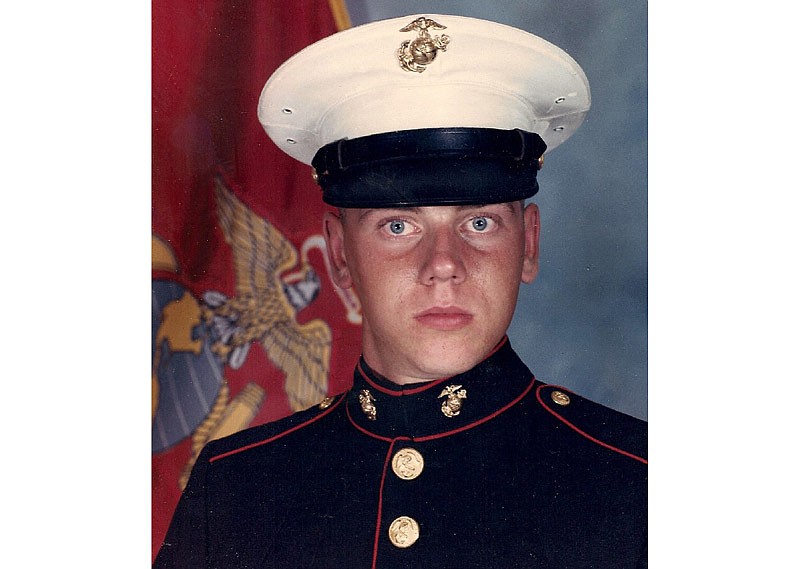"Although I am proud of my service, I really don't have a very exciting story," U.S. Marine veteran Brian Kempker said during a recent interview. "It was one of those situations where it seemed like everyone was joining the service, and it just seemed like the right thing to do at the time."
During the early part of his senior year in 1987, Kempker decided to enlist in the Marine Corps Reserve. The following summer, he left Jefferson City and on his way to the Marine Corps Recruit Depot in San Diego for basic training.
"I got there in September 1988, and after I finished boot camp they sent me to Twentynine Palms (California) for training in electronics and radio," he said. "I anticipated attending Linn Tech (now State Technical College of Missouri) and thought an electronics background might be beneficial to me."
After eight weeks becoming familiar with the various types of radio equipment used by the Marine Corps, Kempker returned to Jefferson City and began attending weekend drills and summer camps with his Kansas City reserve unit.
While pursuing a part-time military career in the reserves, Kempker began working full time at the Michael Prenger Family Center (juvenile detention facility) in Jefferson City, in addition to attending classes at Linn Tech. His educational and full-time employment pursuits would soon experience an alteration due to tensions in the Middle East.
The Persian Gulf War began shortly after former Iraqi leader Saddam Hussein invaded neighboring Kuwait in August 1990. In response, the United States soon began a military buildup in Saudi Arabia named "Operation Desert Shield." This soon transitioned into "Operation Desert Storm," consisting of air attacks followed by a major ground offensive by U.S. and coalition forces.
"I can remember that while we were at our drill in October 1990, our unit was told that we wouldn't be deployed even though the Gulf War had already begun," Kempker recalled. "On Dec. 1, we got the call and were deployed."
Within days of their call-up, Kempker's unit traveled to Camp Pendleton in California to begin training and undergo fitness examinations for an overseas deployment. It was during this time, Kempker said, a health concern was identified that would separate him from his unit.
"At Camp Pendleton, I started having medical issues blood clots," he said. "I was only there for about two weeks when they decided to send me back to the unit in Kansas City. Then they sent me back to Jefferson City, and I worked out of the recruiter's office for a couple of months."
The young Marine was medically cleared by a physician and attempted to rejoin his unit. However, after undergoing another medical review at Camp Lejeune, North Carolina, he was given a medical discharge from the Marine Corps in September 1991.
"It was really one of those situations that was difficult to deal with at first, because I wanted to serve with my unit," he said. "I had spent all of that time training with the guys who became my friends, and we had become a tight-knit group that looked out for each other."
Following his unexpected discharge, Kempker returned to the Prenger Family Center. He tried to return to Linn Technical School. Informed he would have to restart the previous semester, Kempker sought other means to accomplish his career goals.
In 1993, he was hired by the Missouri Capitol Police as a radio dispatcher, a position that allowed him to leverage many of the skills he acquired during his military service. Two years later, he made his official transition to become a law enforcement officer by attending the Law Enforcement Training Institute in Columbia.
"It was one of those decisions that really made sense to me, because law enforcement seemed to run in our family," Kempker said. "My father retired from the Highway Patrol; and my brother retired from the Jefferson City Police Department, where he served as police chief."
The married father of two sons explained although his military career might have been unexpectedly cut short, the brief time he spent in uniform has left him with several enduring memories and benefits.
"When I was first hired on as a radio dispatcher by the Capitol Police, I felt as though it was a job that I was prepared for; the Marines gave me the knowledge and skills to be able to use and troubleshoot radio systems," he said. "Also, because of my training, I felt comfortable speaking over the air.
"And even if the story of my time in the military might not be as exciting as that of other veterans, I am glad that it was an experience that I was able to have. The camaraderie that I developed with my fellow Marines was very important, and I still believe that it was a way for me to give back to the society that has given me my freedom."
Jeremy P. Amick writes on behalf of the Silver Star Families of America.

